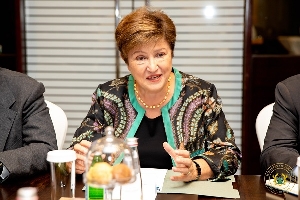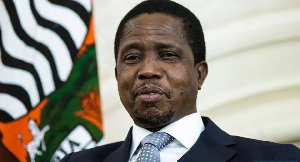Central banks must follow through on the fight against inflation and resist political pressure to cut borrowing costs, the head of the International Monetary Fund cautioned, as more than 60 nations hold elections this year, including the US, UK and India.
Kristalina Georgieva, the fund’s managing director, is urging policy makers to withstand demands for premature interest-rate reductions, which she predicts will intensify as half the world’s population votes in 2024. Greater central bank independence, she wrote in a blog post published Thursday, better protects price stability, which is key for economies to flourish.
“Risks of political interference in banks’ decision making and personnel appointments are rising,” she wrote, without naming any countries. “The bottom line is clear: central bank independence matters for price stability — and price stability matters for consistent long-term growth.”
Calling for an end to tight monetary policy — which helps stifle inflation by driving up borrowing costs — is an easy pressure valve for politicians facing voters angry over higher costs. The US, with arguably the most powerful and influential central bank, isn’t immune to the issue.
Former president Donald Trump, who has said he wouldn’t reappoint Federal Reserve chairman Jerome Powell, has floated a shortlist of candidates including some who are more overtly political than previous chairs, raising questions of their independence.
And President Joe Biden predicted earlier this month that the Fed would move to ease policy, saying strong jobs numbers and cooling inflation created a “sweet spot.” Democrats to his left have appealed directly to the central bank to cut rates, saying they hurt most of the population and stifle needed green investments. By tradition, the White House typically does not comment on Fed decisions, and Biden has previously pledged to respect the central bank’s independence.
South Africa’s monetary institution has fended off recent calls from the ruling African National Congress to broaden its mandate to explicitly promote employment, a move that comes just ahead of the party’s toughest election since taking power in 1994. In Thailand, the prime minister has pledged to pressure the central bank into a rate cut, fueling market bets that policymakers will yield.
Turkish central bank has battled increasing pressure from President Recep Tayyip Erdogan in recent years, with his push to keep rates ultra-low sparking an inflation crisis. A sharp policy turnaround that includes aggressive rate hikes since last May’s elections is trying to restore standing with foreign investors and take price growth under control. Analysts are in consensus that local elections at the end of March will not deter normalisation course — unless the opposition retains power in big cities like Istanbul and Ankara with a very wide margin.
In Poland, the government of Prime Minister Donald Tusk is preparing to probe central bank governor over his alleged political involvement ahead of last year’s general election, while Hungarian authorities have attempted to increase their oversight of the central bank’s activities.
Georgieva said that the current cycle of tighter borrowing — most notably by some of the first-movers in emerging markets — helped keep inflation expectations anchored, which is ultimately healthier for an economy despite the public angst. This contrasts, she said, to the high inflation of 1970s, when clear mandates were rare and political pressure was common.
“Everyone was hurt by this high inflation, boom and bust era,” she wrote.
Business News of Friday, 22 March 2024
Source: bloomberg.com













